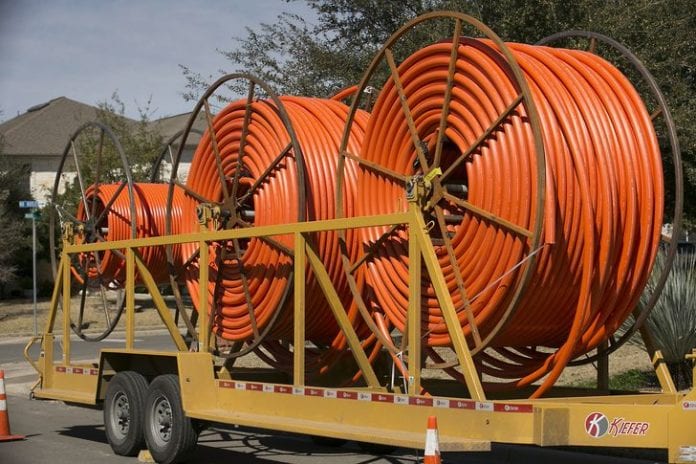Breaking down some of the reasons Google Fiber has yet to gain traction.
Google is one of those company names that everyone recognizes. In fact, Google is the No. 2 most recognized brand in the world according to Interbrand. From Google Analytics and Adwords, to phones, tablets, glasses, Chrome and Chromecast, the tech giant has delivered countless products to people everywhere. Google has dominated the tech field and continues to do so with their innovations, but not all products are a home run.
Google Fiber, the ultra-fast internet service offering 1-gigabit-per-second Internet connection for $70 per month, is one such product some would argue has all but failed. Starting out in Kansas City in 2012, Fiber has since expanded to Atlanta; Austin and San Antonia, Texas; Provo and Salt Lake City, Utah; Charlotte and Raleigh-Durham, North Carolina; Huntsville, Alabama; Nashville; San Francisco and Los Angeles. Considering the service started only four years ago, Google has expanded quickly, but is likely as far as it will go.
Companies like AT&T, Comcast, Verizon Communications, Time Warner Cable and Spectrum have dominated national market for years. But, with a name like Google, you would expect people to jump at the opportunity to sign up for faster internet service. Unfortunately, they haven’t and there are a number of contributing factors.
Recent layoffs
Craig Barratt, SVP at Alphabet and head of Fiber, recently announced he would be stepping down from his role while the company undergoes some strategy changes. Barratt went on to state that Google Fiber will continue operating in current locations, but they are pausing all efforts to expand to other locations. Due to the recent changes, approximately 130 employees have been let go and more layoffs may be looming as growth falls and costs rise.
High start-up costs
In order to introduce Google Fiber to a new location, all new wireline communication systems must be set up. The costs associated with wiring a city are not easily covered by most municipalities, leaving Google to finance many operations. Furthermore, the time and effort to gain zoning approvals and permits leaves many locations asking if the headaches are really worth the cost. For the majority of the U.S., taxpayers aren’t willing to cough up more money for a faster internet service.
Lack of industry partnerships
When you’re the new guy in town, forging local partnerships is a great way to jumpstart your business. However, Google Fiber has been unable to gain quick traction. With competitive rates and a super-sized brand name, many of the mainstream internet providers see Google Fiber as a threat. Companies like AT&T, Comcast and Time Warner Cable have already established themselves as leaders in the market and are reluctant to partner with the search giant. In fact, many ISPs have dropped their rates and increased their speeds in response to Google, according to Forbes.
Lack of municipal support
When Google Fiber was first announced, cities across the United States were excited at the prospect of having the new services in their town. The problem was Google demanded far too much from city officials, including complete access to all city facilities, infrastructure and assets – and at no fee to Google. Bullying around the people that ultimately give you the go-ahead did not go over well with many municipal agencies and thus Google Fiber has taken a backseat to more mainstream internet providers.
Service interruptions
Google Fiber does offer a lot of different services that are attractive to consumers. It provides seamless integration between devices, even allowing you to cast videos and content from your mobile device to your television. It has home phone service included in all internet package and cloud sharing between devices. But service reliability has been an issue. According to many, the services are constantly being interrupted and malfunctioning. With a name like Google, you expect nothing but the best and the experience does not always live up to expectations.
Reaching beyond their means
Offering a gigabit network at $70 per month is a great idea, in theory. The problem is Google never thought through their pricing model. The biggest thing – which we already discussed – is cost. To make an effective return on investment in infrastructure, Google would need to charge $150 or more per month for service. Google didn’t factor in a higher price point, consumer switching cost and the ease at which AT&T, Comcast and Verizon can improve their existing infrastructure to provide better services at a cheaper price.
Google may be a name that most people are familiar with, but the product must meet (and exceed) all expectation. With an extremely high build-out cost combined with a low monthly user rate, for Fiber to reach profitability would require an increase in price or unrealistic rate of expansion. And the lack of industry partners and municipal partners has driven Google Fiber back into the ground. Simply put, Google Fiber has not delivered.

Michael Peggs is the founder of Marccx Media, a digital marketing agency specializing in search engine optimization and search engine marketing. Before Marcxx, Peggs worked at Google in business development, forming digital media and advertising partnerships in the United States and Asia. He is also a contributor to The Huffington Post, FastCompany and Business Insider as well as and podcaster, hosting the iTunes Top 10 New & Noteworthy Podcast You University.
Editor’s Note: In an attempt to broaden our interaction with our readers we have created this Reader Forum for those with something meaningful to say to the wireless industry. We want to keep this as open as possible, but we maintain some editorial control to keep it free of commercials or attacks. Please send along submissions for this section to our editors at: dmeyer@rcrwireless.com.

